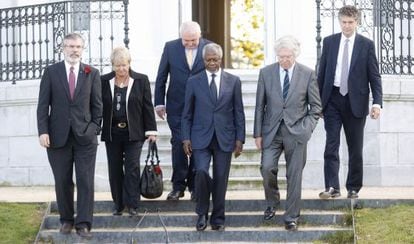ETA reorganizes to focus on politics
Terrorist group says it will maintain “a technical and logistical structure to seal its arsenal”


The Basque terrorist group ETA announced over the weekend that it has “ended the armed struggle” and has reorganized its structure to focus on politics rather than killing.
In a statement published by the radical newspaper Gara, ETA announced that it has completed “a profound transformation process” that includes “the dismantling of the logistical and operational structures derived from the armed struggle.”
ETA announced a definitive ceasefire in October 2011, but failed to disband or turn in its arsenal, laying dormant instead. In February of this year, it staged a symbolic handover of a handful of weapons to a group of international observers, although this gesture was criticized by all parties, including the Basque government, which wants more significant steps.
Now, using terms that make it sound more like a business than an organization that has killed 860 people, ETA says that it will maintain “a technical and logistical structure to complete the sealing of the arsenal.”
Urkullu told Madrid to “govern over what it has to govern, and leave the Basques alone”
It also says it will focus on its political aims, chiefly transfering ETA convicts serving time in far-flung Spanish prisons closer to home, and bringing ETA fugitives living abroad back to the Basque Country.
Yet despite the end of violence, ETA refuses to go away entirely. Rather than dissolve, ETA will “offer Euskal Herria [the name nationalist extremists use for the Basque Country] its points of view and its contributions, but without replacing anybody or taking on roles that are not up to us.”
In other words, it will act in a consulting capacity, advising the radical parties known collectively as “the abertzale left” that are present in Basque politics.
The statement caught the Basque premier off guard. Only hours earlier, Iñigo Urkullu, of the moderate Basque Nationalist Party (PNV), had expressed anger at ETA and at the international mediators who are supposed to be overseeing the disarmament process – a process that never happened, as far as the government knew.
ETA will act in a consulting capacity, advising the radical parties known collectively as “the abertzale left”
Basque spokesman Josu Erkoreka quickly issued a statement in Bilbao, saying that the regional government remains “permanently ready to work, as it has until now, to achieve an orderly, verifiable, definitive and irreversible end to ETA.”
Erkoreka also mentioned the need to restore relations with international observers “to accelerate this end.”
Meanwhile, Urkullu is trying to ensure that Basque politics do not get left out of the national picture, especially now that Catalonia and its planned November referendum on independence are taking center stage.
Last week, the Basque premier sent a letter to Prime Minister Mariano Rajoy, of the Popular Party (PP), requesting a meeting to discuss the ETA issue and other matters concerning self-rule in the region.
Part of Urkullu’s agenda includes a discussion of the Basque region’s own right to hold a popular referendum. The premier has repeatedly complained in the regional parliament about the PP’s apparent attempts at recentralizing power in Madrid through continuous appeals of self-rule legislation. Last June, when he found out that the central government had appealed a Basque offer for positions with the Ertzaintza, the regional police, Urkullu told Madrid to “govern over what it has to govern, and leave the Basques alone.”










































